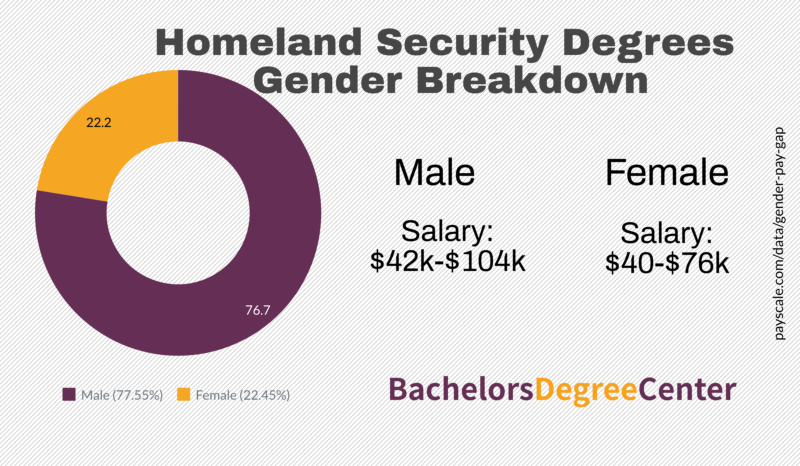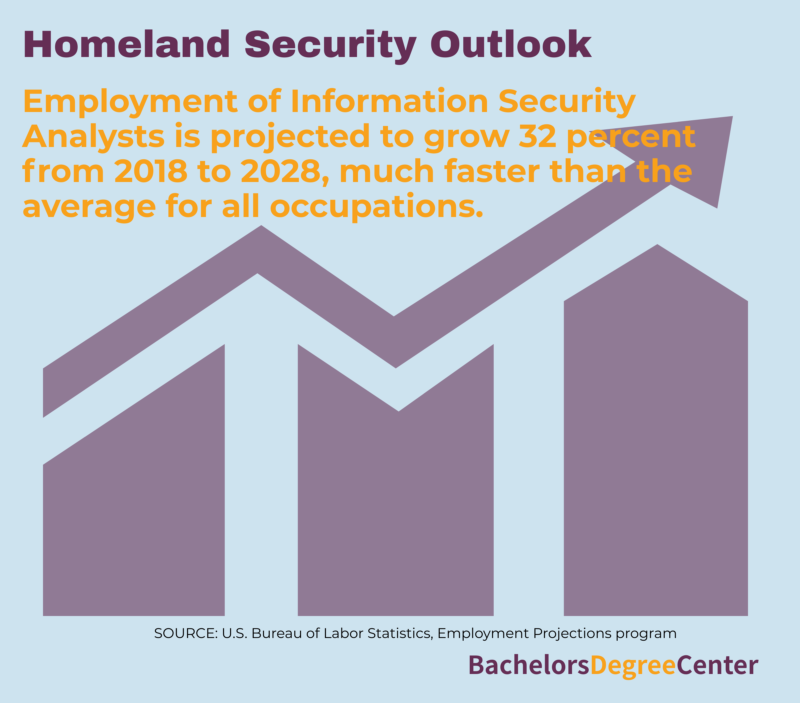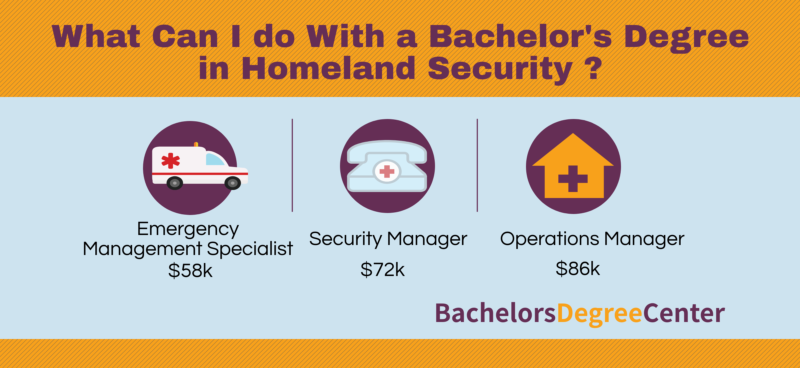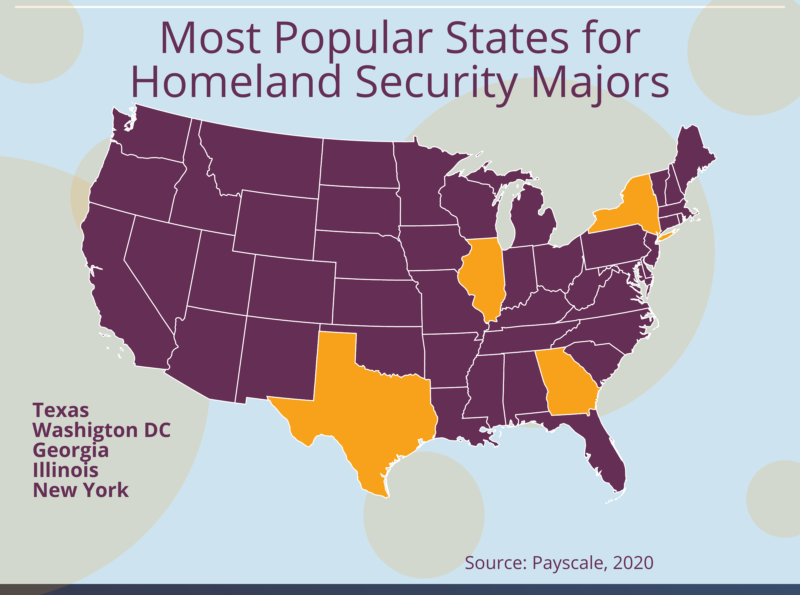Key Information:
- A degree in Homeland Security can lead to various career opportunities, including roles in disaster response, law enforcement, and private security.
- Students can specialize in areas such as disaster response, law enforcement, or security.
- Certifications such as FEMA certification or Emergency Management certification can enhance career prospects and professional development.
Homeland security careers are growing fast. Many people who are starting their higher education, or who are thinking about going back to school are wondering, “what can you do with a homeland security degree?” and “is a homeland security degree worth it?” There are many different factors that weigh into deciding whether homeland security careers are a good fit for a person’s career goals. If you’re interested in protecting your country, keeping the United States strong, and working hard to fight for the safety of others, a degree in homeland security might be a good fit for you. Let’s take a look at some key information you’ll want to keep in mind as you decide whether to pursue a degree in homeland security.
Homeland Security Program Accreditation
As you’re searching for homeland security schools near me, you want to make sure that you’re finding schools that are well recognized by others. Typically, specialized programs have their own bodies of accreditation. An accreditation lets employers know that the program a student has completed has been vetted by experts.
Since the field of homeland security is so new, accreditations are not yet in place for this degree. That being said it’s important that the homeland security schools near me are regionally accredited by a Department of Education approved agency. As you search for homeland security approved universities, be sure to check out the school’s general accreditation page. This will help to ensure that you’re getting your money’s worth by attending a school that has proven itself to be worthy of your time, effort, and tuition dollars.

Types of Homeland Security Degrees
When you enroll to earn your homeland security degree, you’ll find that you have several options when it comes to how you’ll take your classes, and whether you’ll choose a specialty. There are many different ways to earn your homeland security major. As you explore the options for your bachelor of science in homeland security, you’ll want to think about what type of school and specialization make the most sense for your interests in needs. There are many options available for your bachelors in homeland security, and it’s likely that you’ll be able to find the perfect program for you.
Many students who are enrolled in a homeland security degree program have the option of either taking classes in a traditional classroom, or taking classes online. There are advantages to both of these options.
If you’re a student who enjoys the traditional classroom experience, the face to face time available with in classroom learning may be perfect for you. You may also want to consider whether you want to live on campus to make it easier for you to get to your classes. You’ll also want to think about whether your schedule is flexible enough to go with the university’s schedule, which will change each semester. Taking classes on campus allows you to fully immerse yourself in college life, enjoying other students and having the typical experiences associated with earning your degree.
If you prefer an online homeland security degree experience, you may find that your classes are less expensive than traditional classes. While it’s unlikely that you’ll find homeland security courses online free, many schools offer online classes at a discounted rate to both in state and out of state students. You may also find that you’re surrounded by classmates who have years of experience in the field. Many people who choose to take online classes do so because the want to continue working to further their career while also furthering their education. Online classes may have times that you’re required to be online, or you may be allowed to complete your work on your own schedule. Many students find that professors in online classes are just as accessible as professors in a traditional classroom setting.
Some students complete a hybrid program, which allows them to go through their homeland security major courses partially online and partially in the classroom. If you enjoy the one on one experience with a professor in a traditional classroom, but you want some of the flexibility of online learning, a hybrid program may be a great solution for you.
In addition to choosing whether you’ll earn your homeland security degree online or in a traditional classroom, you may be able to choose a specialty within your program. As you browse homeland security bachelor degree programs, pay close attention to whether you’ll be able to choose a specialty. Choosing a specialty is a great way to help yourself stand out to employers and show that you went beyond the standard homeland security degree requirements. While the exact homeland security course description will differ depending on your specialty, these are three of the most common specialty options for people who are earning their homeland security degree.
- Security — Choosing a specialty in security will set you up perfectly for a career working to keep businesses safe. Many people who earn their homeland security degree with a specialty in security go on to own their own security businesses, protecting people who may be targets for crime.
- Law Enforcement — If you’re planning on becoming a police officer or sheriff after graduation, choosing a specialty in law enforcement may be a good fit for you. In addition to learning the standard homeland security material, this specialty will prepare you to take on the unique challenges that come with a badge.
- Disaster Response — Homeland security personnel are heavily involved in disaster response. If you’re interested in working with FEMA or similar government organizations, specializing in disaster response may be a good fit for you.

Certifications/Licenses for Homeland Security Professionals
As you’re working to earn your homeland security degree, it’s important to think about what certifications you may need in order to succeed in your career goals. While having a bachelor’s degree is a great start, many careers require that you go one step further and earn a certification from a governing body. This is especially important for people who have homeland security degrees since the field does not currently have an overall accreditation board to vet individual university programs.
If you’re not currently working toward your bachelors degree in homeland security, you may still be eligible to earn a homeland security certification online or in a traditional classroom. Many jobs require you to have a homeland security certification, but may not require you to have a bachelors degree. Homeland security certification jobs may also be willing to pay for some or all of your college tuition if you choose to get your homeland security degree after you become a certified homeland protection professional.
While it’s unlikely that you’ll find a homeland security certification free, your employer may be willing to pay for your certification, especially if it’s required for your job. If the certification is not required for your job, but you’re still interested in completing the certification process, talk with your employer about how the certification will benefit both your professional development and contribute to the overall mission of the company.
Some of the most commonly required certifications for homeland security professionals include:
- FEMA (Federal Emergency Management Agency) Certification — A FEMA certification ensures that you’re prepared to aid in the handling of national disasters. People who have their FEMA certification are ready to do what it takes in the face of threats to national safety and security. FEMA offers many specializations within their certificate programs, and it’s likely that you’ll be able to find one that’s a perfect fit for your career goals.
- Emergency Management Certification — Earning your emergency management certification shows your employer (or potential employer) that you’re ready to handle any situation that may arise. Many emergency management certification programs require that you have several years of experience in the emergency field before you can be accepted to the program. If you’re interested in emergency management certification, talk with your employer about how you can get the experience necessary to apply to one of these valuable certification programs.
- Homeland Security Certification — A homeland security certification can prepare you to work with the government’s Department of Homeland Security, or to work with private organizations that contract with the government and/ or the military.
No matter what certification route you choose, you’ll want to make sure that the certification program in which you enroll has been supported by the American Board for Certification in Homeland Security. This group of outstanding first responders, homeland security experts, and law enforcement officers works to ensure that homeland security certifications provide students with the information they need to be safe and successful in the field.
Please note that the American Board for Certification in Homeland Security is currently closed, due to some issues concerning the validation of their certifications. Professionals who were a part of the organization are working hard to rectify the issue, and it’s expected that the organization will open again soon.
If you’re wondering how to get homeland security certification, be sure to check regularly on new certifications that become available. The field of homeland security is growing quickly, and new specialties are added by school as the need becomes apparent.
Careers in Homeland Security
As you work toward earning your degree in homeland security, it will soon be time to start looking for homeland security jobs. A degree in homeland security will present you with many options for homeland security jobs, from working in private security to working for the government. While some people already know what career path they’d like to take when they start their degree, others find that the information they learn about options in their career field as they’re earning their degree can shape where they’d like to take their future. Whether you know exactly what you want to do with your future career, or you’re still open to suggestion, rest assured knowing that homeland security jobs come with a fair salary and a high level of job satisfaction.

While a homeland security degree will open many doors for you, it’s key to remember that there will be different homeland security job requirements depending on your specific career and industry. For example, a job in homeland security with the government will have very different homeland security job requirements than a job at a private security firm. The responsibilities at different types of homeland security jobs can differ greatly as well. When you’re applying for entry level homeland security jobs, be sure to look closely at the homeland security job description to make sure the job is something you’re truly interested in. There’s a big difference between working in law enforcement and working for disaster relief, even though both of these jobs fall under the umbrella of homeland security in the United States. Let’s take a look at some of the most popular careers in the homeland security field today.
- Criminal Investigator — Many people who earn their degree in homeland security go on to become criminal investigators, either for the government or for private organizations. Criminal investigators work hard to track potentially criminal activities. They may track criminals, track vehicles, and complete investigations into organizations suspected of criminal activity. While this job can be exciting, it can also be dangerous and stressful. If you choose to go into the field of criminal investigation, it’s important that you’re able to stay strong in the face of setbacks, and can handle high pressure situations well.
- Homeland Security Exercise Analyst — The military and law enforcement agencies regularly create hypothetical scenarios that allow their teams to run through how they would act in the face of an emergency. The job of a homeland security exercise analyst is twofold. First, they plan the exercises to be as close to real life scenarios as possible. Secondly, they evaluate the performance of the teams involved in the exercise, and strategize how the organization can be better prepared for an emergency situation. A homeland security exercise analyst can work in federal, local, and state government settings.
- Customs and Border Protection Officer — One of the key parts of the Homeland Security Department is border control. Customs and border protection officers can work in several settings, including in an office setting, in airports, and at physical borders between the United States and Mexico/ Canada. Officers in this field work to make sure that everyone entering the United States is legally permitted to do so. This job can be dangerous and the hours can be long.
- Intelligence Research Specialist — Both government and private investigations that work to keep people safe need experts in intelligence. People who work in this field work to gather information about potential threats to the nation or the area protected by a private security agency. People in this position are detail oriented and know how to pay attention to their intuition when something seems off. An intelligence research specialist gets to combine security and research to create valuable reports on what could be a potential threat to the security of an organization or group of people.
- Cybersecurity Specialist — The internet is one of the biggest threats to the security of organizations and governments today, and it’s key for homeland security organizations to employ people who are experts in keeping data safe. Cybersecurity specialists must be open to constantly learning new things, as the world of internet security is changing rapidly. Often, cybersecurity specialists are responsible for more than just keeping data safe. They’re also responsible for developing new tactics that detect whether data breaches have occurred. There are many opportunities for cybersecurity experts in both the public and private sectors.
When you’re searching for a job in homeland security, you’ll want to take a close look at the homeland security education requirements for that specific position. While some jobs require a bachelor’s degree in homeland security, others require certification or experience instead. Even if you don’t meet the exact qualifications for a homeland security job, it may be worth applying if you have homeland security experience. Since homeland security is a relatively new field, many organizations are willing to be flexible in their requirements if it means they are able to hire someone who can get the job done right.
Other career opportunities, through federal government agencies like U.S. Customs and Border Protection, U.S. Department of Homeland Security (DHS), the Secret Service, FBI, Transportation Security Administration (TSA), and others include:
- information security analysts
- counterterrorism
- emergency management directors
- national security
- border patrol agent
- intelligence analyst
- immigration and customs enforcement
- special agent
Professionals with an advanced degree in homeland security and emergency management will work in emergency response and preparedness, criminal justice, natural disasters, cyberattacks, public safety, terrorist attacks, and federal law enforcement. While you can get full-time jobs in these areas with a high school diploma, median salary goes up with certifications and a higher degree like a bachelor’s or master’s degree.
Next, we’ll take a look at the different options for your homeland security jobs salary after you finish your degree, according to the Bureau of Labor Statistics (BLS).
Salary for Homeland Security Professionals
The homeland security jobs salary can vary widely depending on many factors. Some homeland security salary options are higher than others, due to factors such as cost of living in the area of the job, years of education required, whether or not benefits are offered, whether tuition assistance is included as a part of the salary package, and more.
In addition to the variants that can affect the initial salary that goes with a job posting, there are many personal factors that can affect differences in salary as well. If you have years of experience in the field, or you’ve completed competitive internships with good results, you may be offered a higher initial salary than someone who does not have these qualifications. If you’ve performed well academically as you earned your homeland security degree, you can use this information to leverage a higher salary offer than someone who did not have great academic performance. Just like with any job, it’s important to remember that a starting salary is always negotiable. There’s no reason to settle for the salary and benefits package initially offered with the job. In many cases, simply asking for a higher salary is all it takes to get an increase.
People who work for the United States Department of Homeland Security typically earn between $40,000 and $128,000 per year, according to Payscale. Of course, these numbers are subject to change over time, and are dependent on individual salary negotiations. Private security contractors typically make between $300 and $750 per day. Many people who earn their homeland security degrees and are interested in pursuing private security career options prefer to work as private contractors instead of for a company. This gives them the ability to make their own schedules and choose the clients with whom they would like to work.
If you’re interested in going into the field of homeland security, it’s important to know that your pay will likely grow over time. While it may take a few years to begin to work your way up the pay scale, having high work performance and being reliable for your department can go a long way when it’s time for a raise or for a promotion. As with any career, it’s vital to advocate for yourself. When it’s time for your annual review to determine your salary, be sure to bring a list of the times you’ve gone above and beyond the call of duty in the past year. Employers typically expect that you’ll reject their initial raise offer, and are prepared to offer more money — often, all you have to do is ask.

Professional Organizations
As a homeland security professional, it’s key to stay on top of your continuing education. The field is growing constantly, and understanding the latest research and techniques can go a long way in keeping you and your organization safe. Let’s take a look at some of the organizations dedicated to helping homeland security professionals stay on top of the latest changes in the field.
- Global Society of Homeland Security Professionals — This organization works to connect government, law enforcement, disaster response, and other first responders to provide support and information to keep others safe in a way that reflects the latest research from around the world.
- National Association of Police Organizations — If you decide to go through the law enforcement option as you pursue your homeland security degree, it’s key to stay connected with other law enforcement professionals. The National Association of Police Organizations provides valuable networking and educational opportunities to help you stay at the top of your game.
While continuing education is a vital part of success as a homeland security professional, belonging to professional organizations can also allow you to network with other professionals, and stay on top of new opportunities in your career field. When you connect with other professionals in homeland security, you’re also creating a support network of people who understand the unique stresses and challenges of your job.
Related Rankings:
25 Best Bachelor’s in Homeland Security
15 Best Online Bachelor’s in Homeland Security
